- Martyn Rainford
- Claire Charnley | The language lesson: equilibrar - to balance
- Helen Cross | Help
- Conway and Young | Dig
- Jo Hassall
- Karen Babayan | The Process of Writing
- Philip Welding
- Priyantha Udagedara | Re-discovering paradise - Painting, representing and re-visioning of identities
- Juliet MacDonald | Collective Bodies: drawings at Leeds bus station
- Corinne Silva | Imported Landscapes
- Harold Offeh | Vito and Me
- THOMPSON-BEARD
- Mick Marston
- Ian Truelove | Paintings
- Jonny Briggs
- Liz Stirling | The Den Project
- Clive Egginton | The City as Bricolage
- Sarah DuFeu
- Alyson Brien
- Alan Dunn
- Kiff Bamford | Research demands performance demands research
- Pete Ellis
- Lisa Stansbie | Zeppelinbend
- Jenny Tennant Jackson | The Emergence of Artificial Culture in Robot Societies
- GREIG JOHNSON | PHD
OVERVIEW
Initially these images and accompanying texts were taken for inclusion in Jane Tormey’s book “Cities and Photographyâ€, under the section “Dreams and Memoryâ€, to be published later in 2012 by Routledge. 4 to 6 images will be used in the book. However the project has become, for me, a piece of research in it’s own right under the working title of “The Lamentationsâ€.
In this section of her book Ms. Tormey considers ideas put forward by Michel de Certeau about the “rhetoric of walking†and Victor Burgin about “looking for the cityâ€. She also embraces the poetic theories of Andre Breton outlined in his book “Nadja†concerning observations of his day-to-day life, episodes, encounters and reflections of events and subsequent associations. It was the Surrealists who positioned the parallel activity of unconscious thought alongside everyday experience permeated by memories of the past.
My photographic images are taken in the area of Manchester known rather emptily as Eastlands or Sportcity. I spent my childhood and teenage years growing up in this east central part of the city, which was then called the district of Bradford, Manchester, famous for its gritty industrial heritage and manufacturing potential. These pictures exhibit locations as they are today and have not been edited to make them into “nicer†or “better†photographs. The addresses describing each site indicate buildings and places that are no longer there.
The associated texts, often anecdotal, reference events and narratives of this “not there†and contradict these often anodyne scenes of the newly mapped “nowâ€. They create poetic paradox where the past flows through the remapped and re-edited present to shape a non committal future. These texts are purposefully sporadic, bitty and brief glimpses of past events, mimicking myriad universes of fragmented but simultaneous occurrences of lived experience. The overall effect is one of an overlapping and meshing, web like narrative extending into infinity.
The visual banality of these black and white photographs introduces spaces for contemplation. Spaces filled with subjective memories that are still compellingly crucial histories to the tribe that made them. Histories that serve to steer sublime emotional experience to an anchorage of place. These once physical happenings are now earthy and pithy verbal recollections made conjectural by time’s passing and the intermittent but relentless deaths of characters, individuals and protagonists.
Pete Ellis, January, 2012.
INTRODUCTION
These photographs represent a hankering loss in time and physicality, only the location endures to be endlessly re-edited and cropped and re-mapped with contemporary architectural design and functionality.
Photographs serve as evident witnesses of what was and detailed meticulous illustrations of what is. Contradictions in time, conflations of place.
Crowded streets, events, places wear out and become redundant to be replaced by anodyne, vacuous, characterless spaces avenued with cenotaph trees, very determinedly and evenly placed, but lacking any sensible meaning of place, their limited narratives utterly abbreviated as they measure out a new “nice†urban space between recently arrived but enigmatically remote and alienating buildings.
Memories dislocated from older dwellings, factories, churches, pubs, schools and shops, free falling and free forming in dispersed virtual emotional expanses that still haunt and surround us daily.
Silent meditative images of the “then†and the “gone†and the “not there†that shadow the new now.
A neutral “now†of grass covered crushed rubble and “bright†modernity and redevelopment and enterprise, that blanket and muffle a zillion miniscule but threaded histories, presently distantly dim but once a blaze of vivid, vital vibrancy.
BRADFORD, MANCHESTER 11.
District 11 within walking distance of central Manchester, which each Catholic parish did every Whit Friday, a teeming meandering of little terraced streets surrounding a coal mine [with the deepest pit shaft in Britain] and a steel wireworks. Heavy industry maintained by an indigenous working class with a fiercely socialist heart [until it was dispersed to the badlands of Wythenshaw or Langley or Whitefield or Hattersley where there was and is absolutely no danger of any heavy industry whatsoever] and a scattering of lively exuberant street schools amongst the busy pubs, library, shops, churches of all denominations, and a market [still there] that had magical hotdogs.
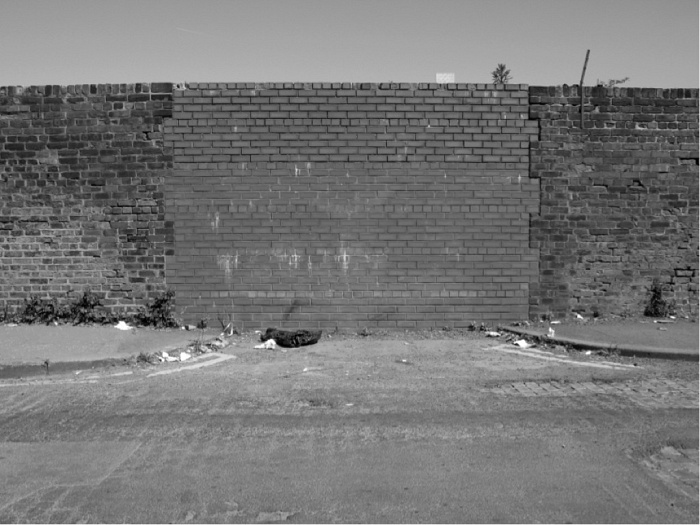
Walled Up Entrance, Corbett Street, Bradford, Manchester 11.
Bricked up lamentations for redundant journeys of industrial functionality whose dusty echoes still faintly reverberate from thinly tarmacked cobbles littered with broken glass and faded unknown trips and destinations.
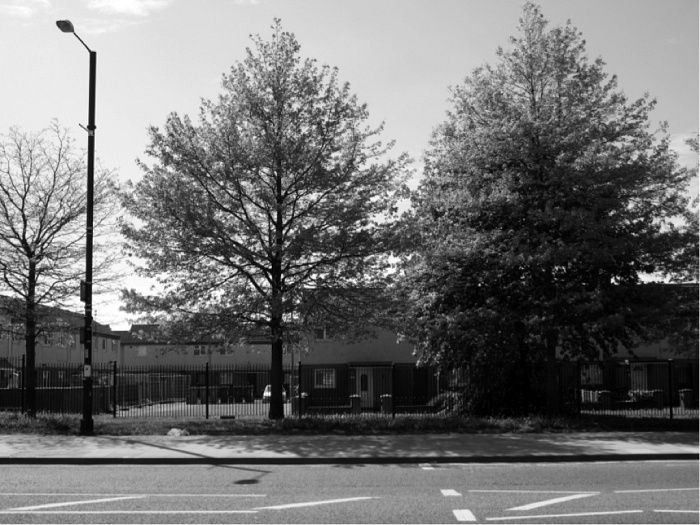
ABC New Royal Cinema, Ashton New Road, Bradford, Manchester 11.
â?? We like to laugh and have a sing song,
Such a happy crowd are we,
Weâ??re all pals together,
We are the minors of the ABC.â?
Sitting in the magically expectant dark on Saturday afternoons with Alec and Kevin and Linda, carefully eating my [not cheap] small bag of cashew nuts bought from Mrs. Macs [who always gave a couple extra, she said, especially in front of my mother], waiting for â??South of Pago Pagoâ? or â??George Formbyâ? or â??Old Mother Rileyâ? and a cartoon. Then we would gallop home, our raincoats fastened by one button at our necks flowing out like capes, because in the osmotically imaginative and clandestinely dreamtime space we had become members and compardres of Zorroâ??s Fighting Legion, even Linda.
The cinema where, as a five year old, I laughed so hard at Charlie Chaplinâ??s â??The Gold Rushâ? the surrounding punters were laughing at me laughing, [to the chuffed amazement of my Dad].
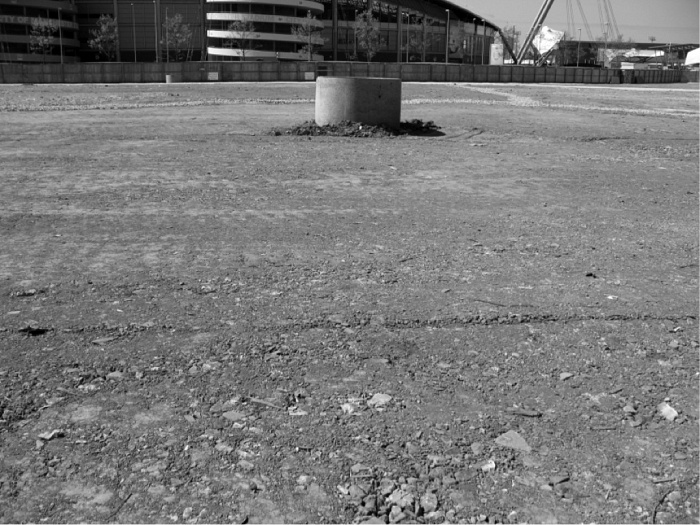
Richard Johnson & Nephew Ltd., Mill Street, Bradford, Manchester 11.
One Saturday afternoon returning from the Royal cinema where I watched Jungle Girl escaping amazingly once again, I met my Dad, the welder, and he took me on an impromptu tour of his workplace. The smell of hot metal and oil, smoke, large gas fuelled vats of sulphuric acid and molten zinc with moving strands of steel wire being pulled through them, the forge and furnace, the dark dust deep cooling tunnels with mobile rows of metal coils, the factory cat and its kittens in their home, an upturned dustbin lid. I still see it all with poignant love and respect; a big brilliant kinetic adventure that filled and fills me with wonder.
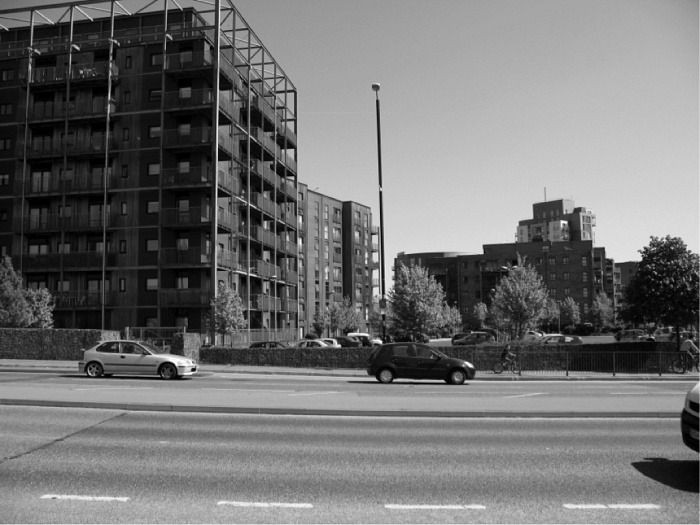
Philips Park Press, Mill Street, Bradford, Manchester 11.
Nichollsâ??s, where the regular metallic music of the presses never seemed to stop day or night, but became another funky melody in a district of singular tunes. The first edition of â??Fanny Hillâ? was published here and the police impounded a dozen or so presses and arrested three secretaries, one was Graham Standenâ??s sister, [who, in front of me, washed her legs in a bowl of hot water in front of the fire with her stockings on, to kill two birds with one stone, she said]. Illicit [and illegal] copies of the rude book furtively changed hands in the Navi and the Alec for months afterwards, briefly contributing to the burgeoning underground counter culture of the time. [Or maybe it was just a prurient fascination with a dirty book].
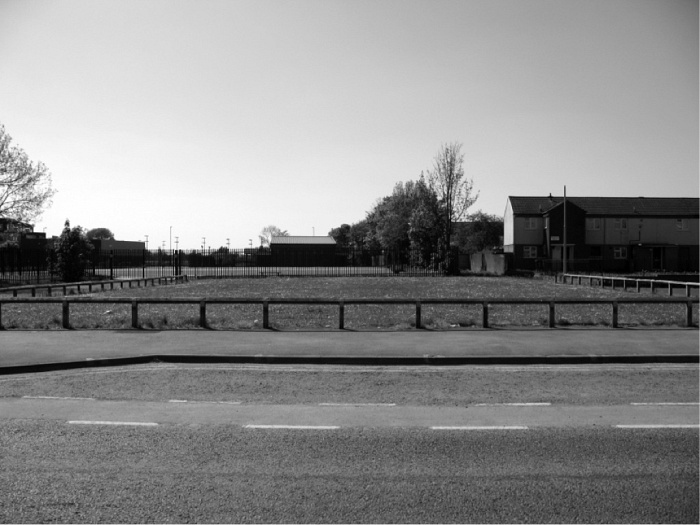
St. Brigid’s R. C. Church, Mill Street, Bradford, Manchester 11.
My years as an altar boy here genuflecting to the sound of a bell, in procession down and round the aisles through clouds of incense, holding candles, saying a novena with my Mam, singing in the choir with Rita Deegan and Mr. Murray as Joe or John pumped the organ, reading my missal in front of a flower filled multi-candle lit altar and feeling very small. Now thereâ??s lots of sky where the church stood.
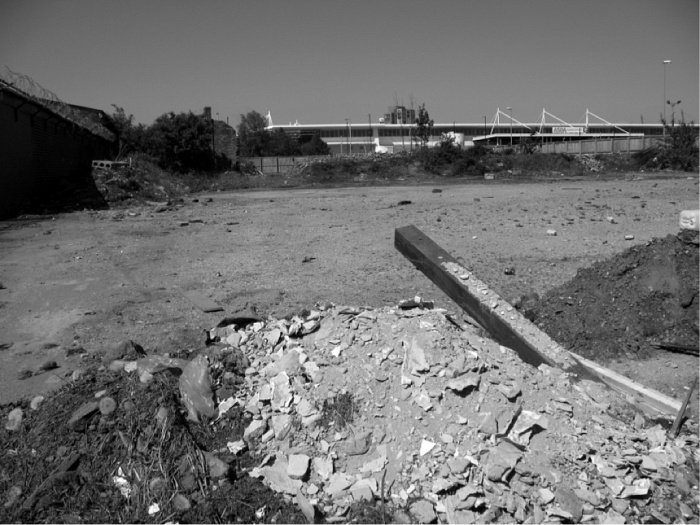
St. Brigid’s R.C. Primary School, Score Street, Bradford, Manchester 11.
Built in 1920, a beautiful, compact, adaptable building, with movable partitions and a sprung floor for dancing and used as the church hall for parish events. [Where Ray Callaghanâ??s Dad would always sing:
â??Chick, chick, chick, chick, chicken,
Lay a little egg for me.
Chick, chick, chick, chick, chicken,
I want one for my tea.
I havenâ??t had an egg since Easter
And now itâ??s half passed three.
So, chick, chick, chick, chick, chicken,
Lay a little egg for me.â?
Much to the delight of Mrs. Callaghan and the mortified embarrassment of Ray]. Demolished over thirty years ago and the land left derelict, [it still is]. An unnecessary
crime of corporate and civic vandalism, a sin. Despite the detritus of rubble some playground tarmac is still there evidencing where bright little boys and girls jostled and pushed and danced in and out of the fairy bluebells under the steady eye of Miss Gahn or Miss Wood and the smell of petrol from the garage next door, [still there].
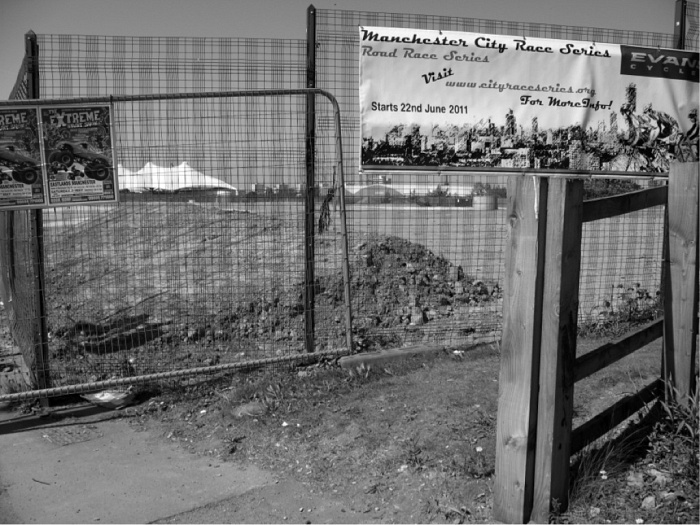
The Forge, Richard Johnson & Nephew Wireworks, Mill Street, Braford, Manchester 11.
Sammy would let me and Joey help him sell the â??Evening Newsâ? to the men as they clocked off work in the early evenings, sometimes. Before they called in for one on the way home. The blacksmith would stand outside his open door on hot days, revealing the white heat of the braising hearth and the pungent sulphurous acrid smell of coke. Where Tommy Bell, in his overalls and brothel creepers and his ginger DA well greased, did an impressive impromptu foot stomp jive in tribute to memories of Bill Haley and the Comets and â??Rock Around the Clockâ? heâ??d seen at tâ??Royal.
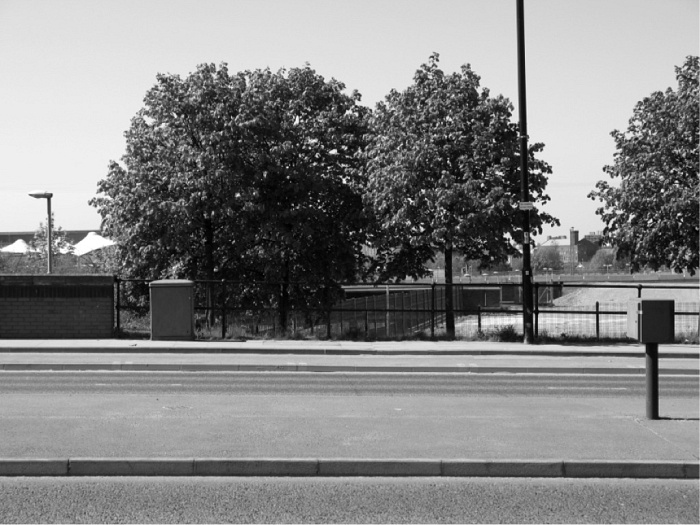
The Navigation Inn, Mill Street, Bradford, Manchester 11.
My Dadâ??s home from home for some years and the subject of too many, often violent confrontations between him and Mam. In later years I played pool with him there or stood in the tiny lobby sucking on cool pints, chewing the fat, being introduced to boozing chums and characters and oddballs in a Joycean narrative of juxtaposed, amiably bizarre conversations. I egged him on one time to play Yoko Onoâ??s â??Open Your Boxâ? on the jukebox. Cries of â??Who the fuck put this on?â? immediately ensued. My Dadâ??s embarrassment in his attempt to be hip lasted a wailing and screaming four minutes, â??You bastardâ?, he said. I grinned. After arguing with a racist about a crisis in Uganda [we came off badly], we watched the floods in Cardiff on TV. Lots of sewage water, lots of damage. â??Isnâ??t that where you live?â?, he asked. It was.
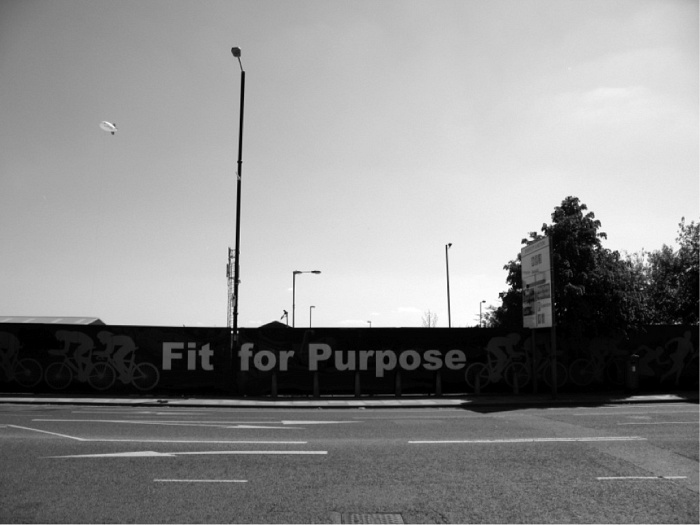
The Post Office, Ashton New Road, Bradford, Manchester 11.
Next door to Coniollaâ??s sweet shop, [where you could get delicious ice cream sodas and sit at the counter and spoon and suck up the long drink of rich ice cold fizz through a straw]. A dark interior, lots of brown paint and pens and ink and blotting paper. Iâ??d cash the odd Christmas or birthday present of a postal order from some auntie or uncle [being an only child in a working class area, I had quite a few]. Before putting the money in my Post Office Savings Account. I was impressed when they stamped my book, something vaguely grown up seemed to be happening.
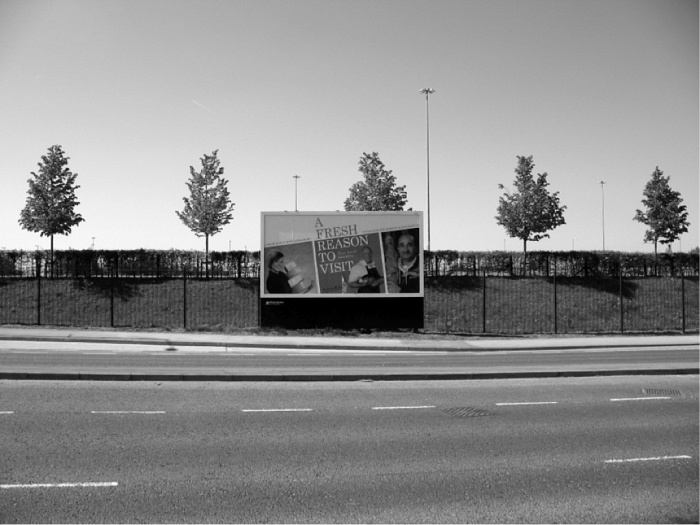
The Park Inn, Mill Street, Bradford, Manchester 11.
A place of startling characters, conversation, argument, specific stories and anecdote. A space to observe and listen in, drinking cold lager in small, crowded, animated rooms with my Dad, watching TV; and as the film â??Zuluâ? came on, Terry, the bin man, shouted: â??Here we go lads, Beswick versus Moss Sideâ?. Just opposite the night-time dark mystery of Philips Park on Mill Street.
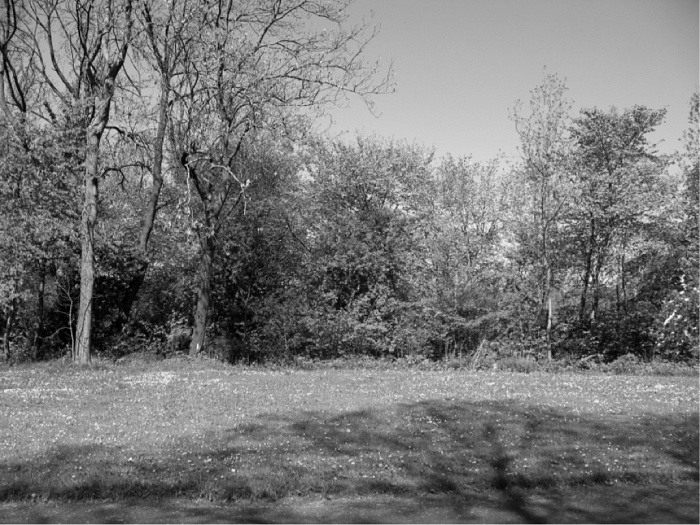
The Toffee House, Philips Park, Bradford, Manchester 11.
You could get tea and crisps and pies here and Wallâ??s ice cream wafers that were nice [but never tasted as good as Granelliâ??s], before watching the â??Blue Diamondsâ? dance band [drums, accordion, saxophone] on the grass on an odd summer evening. Before the park was locked up for the night to stop the trees from straying and getting lost.
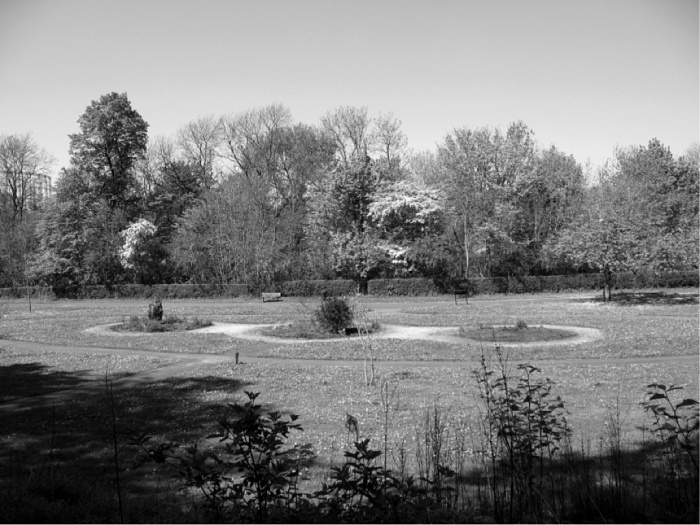
The Valley, Philips Park, Bradford, Manchester 11.
They used to bed this out twice every year and plant every flowerbed with tulip bulbs for Tulip Sunday, which was a big and beautiful event. Bob Redford, a fitter at Mather and Platts and a fine amateur photographer recorded the event a number of times. People would stroll around the garden absorbing the quiet atmosphere, enjoying banks of pure and vivid colour. A day out, something to look forward to and savour. One summer I had a job in the park for a few months, Dennis said to me with a shrug â??Itâ??s bobbins this place, Pete, bobbinsâ?. And they donâ??t bed out twice a year and they donâ??t plant tulips anymore.

